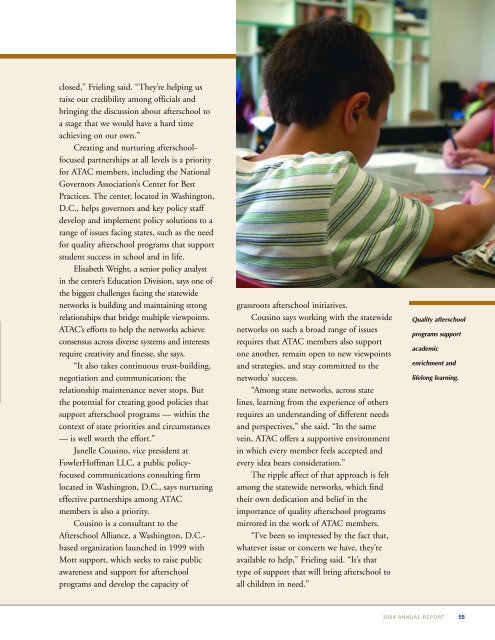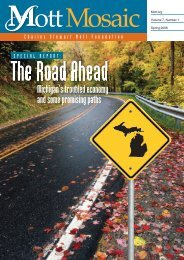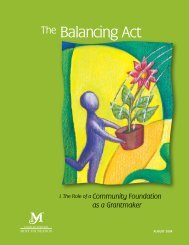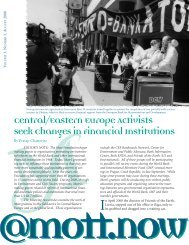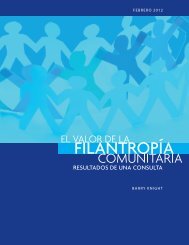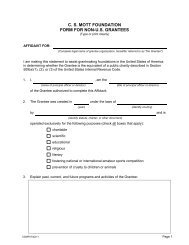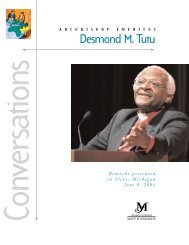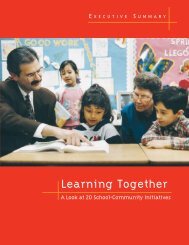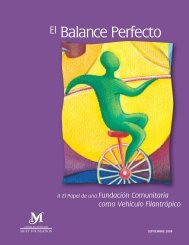Annual Report 2004 - Charles Stewart Mott Foundation
Annual Report 2004 - Charles Stewart Mott Foundation
Annual Report 2004 - Charles Stewart Mott Foundation
Create successful ePaper yourself
Turn your PDF publications into a flip-book with our unique Google optimized e-Paper software.
closed,” Frieling said. “They’re helping us<br />
raise our credibility among officials and<br />
bringing the discussion about afterschool to<br />
a stage that we would have a hard time<br />
achieving on our own.”<br />
Creating and nurturing afterschoolfocused<br />
partnerships at all levels is a priority<br />
for ATAC members, including the National<br />
Governors Association’s Center for Best<br />
Practices. The center, located in Washington,<br />
D.C., helps governors and key policy staff<br />
develop and implement policy solutions to a<br />
range of issues facing states, such as the need<br />
for quality afterschool programs that support<br />
student success in school and in life.<br />
Elisabeth Wright, a senior policy analyst<br />
in the center’s Education Division, says one of<br />
the biggest challenges facing the statewide<br />
networks is building and maintaining strong<br />
relationships that bridge multiple viewpoints.<br />
ATAC’s efforts to help the networks achieve<br />
consensus across diverse systems and interests<br />
require creativity and finesse, she says.<br />
“It also takes continuous trust-building,<br />
negotiation and communication; the<br />
relationship maintenance never stops. But<br />
the potential for creating good policies that<br />
support afterschool programs — within the<br />
context of state priorities and circumstances<br />
— is well worth the effort.”<br />
Janelle Cousino, vice president at<br />
FowlerHoffman LLC, a public policyfocused<br />
communications consulting firm<br />
located in Washington, D.C., says nurturing<br />
effective partnerships among ATAC<br />
members is also a priority.<br />
Cousino is a consultant to the<br />
Afterschool Alliance, a Washington, D.C.-<br />
based organization launched in 1999 with<br />
<strong>Mott</strong> support, which seeks to raise public<br />
awareness and support for afterschool<br />
programs and develop the capacity of<br />
grassroots afterschool initiatives.<br />
Cousino says working with the statewide<br />
networks on such a broad range of issues<br />
requires that ATAC members also support<br />
one another, remain open to new viewpoints<br />
and strategies, and stay committed to the<br />
networks’ success.<br />
“Among state networks, across state<br />
lines, learning from the experience of others<br />
requires an understanding of different needs<br />
and perspectives,” she said. “In the same<br />
vein, ATAC offers a supportive environment<br />
in which every member feels accepted and<br />
every idea bears consideration.”<br />
The ripple affect of that approach is felt<br />
among the statewide networks, which find<br />
their own dedication and belief in the<br />
importance of quality afterschool programs<br />
mirrored in the work of ATAC members.<br />
“I’ve been so impressed by the fact that,<br />
whatever issue or concern we have, they’re<br />
available to help,” Frieling said. “It’s that<br />
type of support that will bring afterschool to<br />
all children in need.”<br />
Quality afterschool<br />
programs support<br />
academic<br />
enrichment and<br />
lifelong learning.<br />
<strong>2004</strong> ANNUAL REPORT<br />
55


